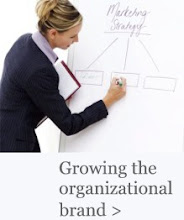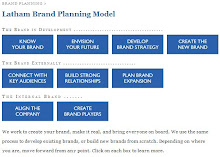There hasn't been a bigger idea than a $700 billion bailout.
That's an eye-opener, whichever way you look at it.
Yet, what actually happened to that $700 billion bailout concept this week, is a lesson for all of us who manage ideas, shape stories and messaging, and build futures.
As you know, the $700 billion concept failed.
It failed because members of Congress were uncertain about the program, and members of Congress were uncertain because their constituents were enraged.
Rage is a very difficult force to manage.
It doesn't matter that rage was misdirected. It doesn't matter that rage was pointing in the wrong direction. Rage is rage.
At the core of the $700 billion bailout, however, was -- and still is -- a very good business idea.
In essence, Treasury officials argued:
All those 'failed' mortgages aren't worthless.
They are certainly worth something today, and at some point in the not-so-distant future, they will be worth more -- in fact, much more than they are worth today.
So let's buy those mortgages, said Treasury.
Let's manage them intelligently and protect the assets.
And then, at some point in the future, when they have substantially regained their value, let's sell them.
In the process, we will recapture the investment we made in buying mortgages in the first place -- and then some -- and we will be in a great position to return the proceeds to the American people.
It's likely those proceeds will be worth more than $700 billion. A lot more.
Doesn't that make sense?
Effectively, that's what the so-called $700 billion bailout plan -- or rescue plan -- was all about.
It wasn't about giving money to Wall Street.
It wasn't about mega-bonuses to chief executives.
It was a serious, well-considered investment by Treasury in assets that will increase in value (probably sooner, rather than later) and can be sold at a profit -- or at zero loss -- for the benefit of the American people.
Which is a pretty sound idea, by any measure.
Best of all, it's not a difficult concept to understand or embrace.
But, amazingly, did you ever hear anything like this clearly articulated this past week -- by Treasury officials, House or Senate members, or anyone, for that matter?
No, you didn't.
You might have heard isolated voices, especially in the aftermath.
But the story above wasn't Treasury's pitch.
It should have been.
Our view is that it isn't hard to rationalize complex ideas, make them simple, and communicate them clearly so people can understand them and embrace them.
Or it shouldn't be.
But apparently, this week, that was a tall order.
We hope that reality, plain talk, and understanding will prevail in the days ahead.
Tuesday, September 30, 2008
Friday, September 26, 2008
Obama won (but)
That was a mild debate.
Using techniques we use to evaluate and score messaging and commitment, Sen. Barrack Obama scored 92 over Sen. John McCain's 67 in tonight's debate in Oxford, Mississippi.
That looks like a resounding victory -- but.
We use a subjective analysis, based on the ideas the candidates share, their ability to communicate simply and clearly, and their passion -- essentially, whether the ideas they expressed were true, emotional, and heartfelt, or whether they were coldly crafted in the campaign war room.
Our assessment is simple.
Tonight, Barrack Obama won.
But who did better than expected? Well, John McCain.
On the financial crisis, Sen. Obama scored 37 over Sen. McCain's 29 score, which involved answers to questions about the proposed $700 billion bailout, Presidential leadership, and given inevitable budget constraints, what has to be sacrificed in the future.
In foreign affairs, both candidates performed exceptionally well. Sen. Obama was slightly ahead in Iraq. They equalled each other on Afghanistan. Regarding Iran, equal again. A draw.
But when it came to Russia, Sen. Obama scored 6 to Sen. McCain's 4. Based on his comments, Obama has a better insight into Russia. His responses were more detailed, and scored better.
Moderator Jim Lehrer's curious question about a 911-style attack today also had Sen. Obama ahead, 5 to 3. (But why did he ask a question like that?)
If you look at the data, who did best? The answer says Obama, certainly, in detail, but nobody, really.
McCain did better than expected, which may be construed as a victory. But he didn't win outright. Neither did Obama.
In the end, the debate was about two Senators, seemingly comfortable with each other competing for another Senate term. This told us a lot about each candidate, and how they grind the details of Congress.
But this is a Presidential campaign about the future.
The debate told us little about how they see the future, how they would shape our lives, and how they would make the future happen.
Maybe that comes next.
Sen. Obama's option for the next debate: Don't hold back. Shape your vision for the future. Paint a vivid picture of the future that all of us can see, realize, and achieve. Show us how Government is on our side, hoping that we will actually achieve our future, and how you will help us make that happen.
Sen. McCain's option for the next debate: Don't hold back. Shape your vision for the future. Paint a vivid picture of the future that all of us can see, realize, and achieve. Show us how Government is on our side, hoping that we will actually achieve our future, and how you will help us make that happen.
We look forward to the next debate.
P.S. We have no political affiliations, connections, or contacts.
Using techniques we use to evaluate and score messaging and commitment, Sen. Barrack Obama scored 92 over Sen. John McCain's 67 in tonight's debate in Oxford, Mississippi.
That looks like a resounding victory -- but.
We use a subjective analysis, based on the ideas the candidates share, their ability to communicate simply and clearly, and their passion -- essentially, whether the ideas they expressed were true, emotional, and heartfelt, or whether they were coldly crafted in the campaign war room.
Our assessment is simple.
Tonight, Barrack Obama won.
But who did better than expected? Well, John McCain.
On the financial crisis, Sen. Obama scored 37 over Sen. McCain's 29 score, which involved answers to questions about the proposed $700 billion bailout, Presidential leadership, and given inevitable budget constraints, what has to be sacrificed in the future.
In foreign affairs, both candidates performed exceptionally well. Sen. Obama was slightly ahead in Iraq. They equalled each other on Afghanistan. Regarding Iran, equal again. A draw.
But when it came to Russia, Sen. Obama scored 6 to Sen. McCain's 4. Based on his comments, Obama has a better insight into Russia. His responses were more detailed, and scored better.
Moderator Jim Lehrer's curious question about a 911-style attack today also had Sen. Obama ahead, 5 to 3. (But why did he ask a question like that?)
If you look at the data, who did best? The answer says Obama, certainly, in detail, but nobody, really.
McCain did better than expected, which may be construed as a victory. But he didn't win outright. Neither did Obama.
In the end, the debate was about two Senators, seemingly comfortable with each other competing for another Senate term. This told us a lot about each candidate, and how they grind the details of Congress.
But this is a Presidential campaign about the future.
The debate told us little about how they see the future, how they would shape our lives, and how they would make the future happen.
Maybe that comes next.
Sen. Obama's option for the next debate: Don't hold back. Shape your vision for the future. Paint a vivid picture of the future that all of us can see, realize, and achieve. Show us how Government is on our side, hoping that we will actually achieve our future, and how you will help us make that happen.
Sen. McCain's option for the next debate: Don't hold back. Shape your vision for the future. Paint a vivid picture of the future that all of us can see, realize, and achieve. Show us how Government is on our side, hoping that we will actually achieve our future, and how you will help us make that happen.
We look forward to the next debate.
P.S. We have no political affiliations, connections, or contacts.
Wednesday, September 24, 2008
Probably the best campaign on television today
We don't know if U.S. oilman T. Boone Pickens has a major stake in American natural gas.
Frankly, we don't care.
Mr. Pickens's simple, plain talk introduction of a stunningly simple, brilliant plan for energy evolution in this country is, in a word, breathtaking.
No politican has articulated a concept so simply, so clearly.
No public interest group has expressed such a rational, common sense approach to taking responsibility for our energy future.
No critic, at least so far as we can see, has seriously challenged Mr. Pickens's approach, which is not only informative, but educational. This is the kind of idea we tell our friends about.
Mr. Pickens, and the people who worked with him to create these messages, deserve major kudos.
A complicated energy scenario is rationalized and made clear.
A major opportunity is clearly articulated.
A rational transition is explained in detail.
A viable choice is presented for all of us.
Communication does not get any better than this.
This is a program to be admired for a whole host of reasons, not the least of which is to be considered and evaluated by energy decision makers.
And there's a simple test for the Pickens Plan.
Does anyone have a better idea?
P.S. We have no connection with the PickensPlan, their people, or their agencies.
Subscribe to:
Posts (Atom)


